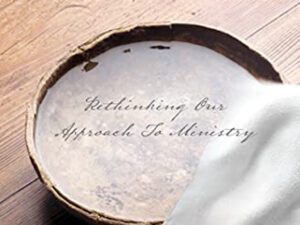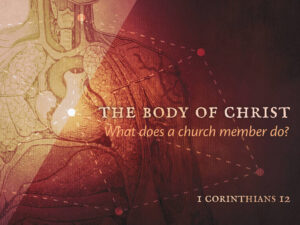Making the Invitation Inviting
 I have been reading a chapter of Mike Ireland’s book, The Gift of Ministry, each morning in the office. Each chapter is about four pages and has some practical encouragement or ideas about life as a minister. Last week one of the topics dealt with our tradition of having an invitation near the end of our services.
I have been reading a chapter of Mike Ireland’s book, The Gift of Ministry, each morning in the office. Each chapter is about four pages and has some practical encouragement or ideas about life as a minister. Last week one of the topics dealt with our tradition of having an invitation near the end of our services.“Does every sermon need to close with an invitation? There are certain traditions that accompany the action of ‘extending the invitation.’ For example, any reference to the ‘invitation song’ we are about to sing will immediately send an energy across the auditorium. People who before were sitting tranquilly in their pew suddenly begin moving as if they were gathering up their belongings to catch the last bus of the day. If nothing else, church folks are always ready to sing the song that signals an end to the sermon.”
He also wrote about how some churches no longer offer the invitation. The reason is simple: it is often an invitation that goes unanswered. Rather than the intended outcome of people coming to recommit their lives to Christ or ask for prayer, it is just a time for the preacher to stand there waiting awkwardly. That first step into the aisle is incredibly difficult for most people. Now that our services are live streamed, it is even more so. Still we keep inviting.
Beginning this Sunday, we will offer another way for anyone who would like to respond to the invitation. I will be in the front of the auditorium with one of our elders as usual, but another of our elders and his wife will also be in the classroom at the southwest corner of the building. Our hope is that this will provide another option for anyone who would like to respond in a more private setting. Both options will be available each time we offer the invitation. “Hear the invitation; come whosoever will.”
Brian
Give Me Liberty
 Since it is the fourth of July weekend, you might have already finished the rest of that phrase in your mind: “or give me death.” Those defiant words of Patrick Henry helped shape a nation and its leaders. As much as we value liberty in our country, we are even more thankful for the liberty that God gives. In our study of the book of James both last week and this week, James mentions the “law of liberty.” God offers us freedom from sin and death, but that freedom was never intended to create an “anything goes” way of life. In the midst of that discussion of liberty, James emphasizes the importance of our actions matching our beliefs. He reminds us that our actions toward others are incredibly important in the eyes of the God who frees us.
Since it is the fourth of July weekend, you might have already finished the rest of that phrase in your mind: “or give me death.” Those defiant words of Patrick Henry helped shape a nation and its leaders. As much as we value liberty in our country, we are even more thankful for the liberty that God gives. In our study of the book of James both last week and this week, James mentions the “law of liberty.” God offers us freedom from sin and death, but that freedom was never intended to create an “anything goes” way of life. In the midst of that discussion of liberty, James emphasizes the importance of our actions matching our beliefs. He reminds us that our actions toward others are incredibly important in the eyes of the God who frees us.In John 8:31-32, Jesus also talks about freedom when He says, “If you abide in my word, you are truly my disciples, and you will know the truth, and the truth will set you free.” If we want to live lives that are truly free of sin and death, we will choose in our freedom to follow Jesus and to recognize His truth. In our independence, we actually become dependent on the God who loves us and set us free.
Happy Dependence Day does not quite have the same ring to it, but it is something that followers of Jesus can celebrate every day. We depend on God. Paul captures that concept very well in 2 Corinthians 3:4-5, “Such is the confidence that we have through Christ toward God. Not that we are sufficient in ourselves to claim anything as coming from us, but our sufficiency is from God.” We are not self-sufficient. We know that in His perfect love, God provides for us and also frees us. That is true freedom.
Brian
For the wages of sin is death, but the free gift of God is eternal life in Christ Jesus our Lord. – Romans 6:23
Siblings
 After growing up as an only child, I never understood what it was like to have siblings. There was no one to share a room with or battle for control of the TV. There were no comparisons to an older brother or sister by teachers at school. There was no sibling to bother my friends and no sibling’s friends to bother. Having two kids of our own has been an eye-opening experience. Sometimes one would defend the other. Sometimes one had to be separated from the other. There were agreements and disagreements, both of which could be intense. There is frustration and love, silence and laughter. Many of you have experienced the same things.
After growing up as an only child, I never understood what it was like to have siblings. There was no one to share a room with or battle for control of the TV. There were no comparisons to an older brother or sister by teachers at school. There was no sibling to bother my friends and no sibling’s friends to bother. Having two kids of our own has been an eye-opening experience. Sometimes one would defend the other. Sometimes one had to be separated from the other. There were agreements and disagreements, both of which could be intense. There is frustration and love, silence and laughter. Many of you have experienced the same things.As we finish the first chapter of James this Sunday morning, it is a good time to remember who wrote this book: the brother of Jesus. We talked a little bit the first week about what it might have been like to grow up with a brother who clamed to be the Son of God only to figure out in adult life that He actually IS the Son of God. That is one thing that makes the writing of James so worthwhile to us. James himself took a journey of faith. He did not start out as a believer, but he definitely ended up there. He wants us to journey into a faith that acts.
I believe that one of the major themes in his book is one of the big reasons why he believed in his brother. Jesus did not just say. He did. Think of how many sibling disagreements Jesus must have reacted to by being a peacemaker. How many times did He go the second mile or turn the other cheek? Even though James was slow to grow into full faith, He knew that Jesus was a person who practiced what He preached. That must have been one of the many reasons that James came to believe what seemed to be impossible: his brother is his Messiah.
Brian
But be doers of the word, and not hearers only, deceiving yourselves. – James 1:22
Pentecost
 We have talked before about the fact that historically churches of Christ have not emphasized religious holidays. Although in our homes we might put up trees at Christmas or hunt for eggs on Easter, our congregations may or may not mention those days at all. It would stand to reason then that you might not realize the significance of this Sunday: it is the day of Pentecost.
We have talked before about the fact that historically churches of Christ have not emphasized religious holidays. Although in our homes we might put up trees at Christmas or hunt for eggs on Easter, our congregations may or may not mention those days at all. It would stand to reason then that you might not realize the significance of this Sunday: it is the day of Pentecost.The day of Pentecost that occurred in Acts 2 is one of the most significant days in the history of the church. In fact, Acts 2:38 is one of our favorite verses and the reason we say what we do when someone is baptized. As we are in the midst of our study about the church, I would like to point out five things from that chapter.
- The apostles are together (2:1). Maybe they’re just waiting for what comes next. Maybe it’s an intended time of fellowship. Or maybe that is just how they do life. Whatever the reason, community is important to them.
- The Holy Spirit is there (2:2-4). As we get into discussions about spiritual gifts today, we miss the importance of the work of the Spirit today. He gives comfort, assists us in prayer, and His fruit is shown in our lives just to name a few.
- God has a way of connecting people who will tell the story with people who need to hear it (2:5-14). We need to remember that did not stop on that day, and that we are those people who can tell the story.
- The story of Jesus is powerful (2:14-41). Even though we are not apostles speaking in languages we do not know, the story of Jesus we tell changes lives.
- The chapter begins and ends with being together (2:1, 2:42-47). Father, Son and Spirit are together. The apostles are together. His church did life together. The church still functions best when we do life together.
Brian
Reaching Out
 In Colossians 4:2-5 Paul writes, “Devote yourselves to prayer, being watchful and thankful. And pray for us, too, that God may open a door for our message, so that we may proclaim the mystery of Christ, for which I am in chains. Pray that I may proclaim it clearly, as I should. Be wise in the way you act toward outsiders; make the most of every opportunity.” We want to be a church that is looking for those open doors. We want to seek out ways to connect with our community. We want to love and serve. We want to help spread the good news in Ada and around the world. There is a lot of truth in those four verses that can help us toward those goals.
In Colossians 4:2-5 Paul writes, “Devote yourselves to prayer, being watchful and thankful. And pray for us, too, that God may open a door for our message, so that we may proclaim the mystery of Christ, for which I am in chains. Pray that I may proclaim it clearly, as I should. Be wise in the way you act toward outsiders; make the most of every opportunity.” We want to be a church that is looking for those open doors. We want to seek out ways to connect with our community. We want to love and serve. We want to help spread the good news in Ada and around the world. There is a lot of truth in those four verses that can help us toward those goals.Begin and continue with prayer. Prayer permeates Paul’s efforts. It should be in all that we do as well.
The prayer is in first person. Notice what Paul asks to be prayed for: “us, our message, that we may proclaim, that I may proclaim.” Paul is not just wanting lives to be changed because of an open door. He wants to be personally used by God in the process. In fact, his ending the sentence with “as I should” indicates he does not only desire to do it. He feels a responsibility.
The prayer is in first person. Notice what Paul asks to be prayed for: “us, our message, that we may proclaim, that I may proclaim.” Paul is not just wanting lives to be changed because of an open door. He wants to be personally used by God in the process. In fact, his ending the sentence with “as I should” indicates he does not only desire to do it. He feels a responsibility.
How we act matters. This is a place where Paul encourages us to use wisdom. How we are perceived a major factor in the willingness of people to listen to our message. It is not enough to be right. We must also act wisely.
Look for and act on opportunities. Our time on earth is temporary. Our time with specific people is even less. We must use the time that God gives us well.
Look for and act on opportunities. Our time on earth is temporary. Our time with specific people is even less. We must use the time that God gives us well.
Let’s pray this week that God will open doors for us to show Him to others and that we will be ready to step through those doors. For that we can all be thankful.
– Brian
Being a Church Member
 I hope you have been as encouraged by the last few weeks at Southwest as much as I have. We finished our study of the Gospel of Mark by looking at the resurrection two weeks ago and did something different last Sunday with a time focusing on the story of Jesus told through scriptures and songs. As much as I enjoy preaching, it is good to change gears from time to time to see Jesus again in a different way. Our in-person worship attendance has grown to the point that we will be fully opening the middle to sections on the floor this Sunday. In fact, our attendance last Sunday was higher than it was on March 8, 2020, the last Sunday before COVID-19 changed so much in our lives.
I hope you have been as encouraged by the last few weeks at Southwest as much as I have. We finished our study of the Gospel of Mark by looking at the resurrection two weeks ago and did something different last Sunday with a time focusing on the story of Jesus told through scriptures and songs. As much as I enjoy preaching, it is good to change gears from time to time to see Jesus again in a different way. Our in-person worship attendance has grown to the point that we will be fully opening the middle to sections on the floor this Sunday. In fact, our attendance last Sunday was higher than it was on March 8, 2020, the last Sunday before COVID-19 changed so much in our lives.On Wednesday evenings we have been going back to basics as we talk about church doctrines and why we do what we do. It can be easy to forget why we do those things that are so familiar to us. On Sunday evenings we have been looking at the command and promise to be disciples who make disciples. Spreading the gospel is a task we all have. As Christians, our responsibility does not end there.
For the next six weeks on Sunday mornings, we will look at the church from one more angle: what does a church member do? Sharing the good news is part of who we are, and keeping with our doctrines and traditions is important; but there is more to it than that. Being a member of the church requires commitment, a good attitude, a willingness to work from all of us. As we have learned on Wednesdays about what the church and congregations do as a whole, we will see how we fit into that group and what we can do to help the church be more of what God designed it to be.
Rather, speaking the truth in love, we are to grow up in every way into him who is the head, into Christ, from whom the whole body, joined and held together by every joint with which it is equipped, when each part is working properly, makes the body grow so that it builds itself up in love. – Ephesians 4:15-16
The Beginning of the Gospel
 That is how Mark describes his book in the first verse. As we finish our study of Mark this week, it is good to remember how it began. What follows over sixteen chapters is not just good news. It is the best news. In the life of Jesus we learn more about who God is and what matters to Him. We learn about who He created us to be. We learn about how we can treat each other in a way that honors Him. We see that He cares deeply for people.
That is how Mark describes his book in the first verse. As we finish our study of Mark this week, it is good to remember how it began. What follows over sixteen chapters is not just good news. It is the best news. In the life of Jesus we learn more about who God is and what matters to Him. We learn about who He created us to be. We learn about how we can treat each other in a way that honors Him. We see that He cares deeply for people.Throughout His life, all kinds of different people meet Jesus: rich and poor, healthy and sick, good and bad, religious leaders and people those leaders would avoid, people who sought Him and people who were sought by Him, skeptical and desperate, men, women and children. In each case we saw that Jesus values people in a way very different than the world around Him, and we saw that people were changed because of their contact with Him.
Each spring as we look at the life of Jesus through the eyes of one of the gospel writers, I am reminded of the love of God in this plan He had to bring us to a relationship with Him by sending His only Son. I hope that you are blessed by seeing the life of Jesus again. I pray that like those people who meet in the stories we read, you are changed by Him. And most of all, I hope we are reminded how to follow Jesus as we grow closer to Him and to each other on the journey God has prepared for us.
– Brian
For while we were still weak, at the right time Christ died for the ungodly. For one will scarcely die for a righteous person—though perhaps for a good person one would dare even to die— but God shows his love for us in that while we were still sinners, Christ died for us. (Romans 5:6-8)
Just As He Told You
 Have you ever caught yourself watching an infomercial on TV? Whether it’s an ad for a product for something to get you organized, a product that will make your car look like new or the latest diet or exercise gadget, it makes some bold claims that seem too good to be true. Even though you’re skeptical, sometimes the sales pitch is so good that you decide to give it a try. Usually you end up feeling like you’ve wasted your money, and it does not work at all like it did on your TV screen. It ends up in a box with the other things that were not all you thought they would be.
Have you ever caught yourself watching an infomercial on TV? Whether it’s an ad for a product for something to get you organized, a product that will make your car look like new or the latest diet or exercise gadget, it makes some bold claims that seem too good to be true. Even though you’re skeptical, sometimes the sales pitch is so good that you decide to give it a try. Usually you end up feeling like you’ve wasted your money, and it does not work at all like it did on your TV screen. It ends up in a box with the other things that were not all you thought they would be.The claim Jesus made during His life about His resurrection was beyond bold. It seemed impossible. It sounded too good to be true. In fact, Peter had rebuked Jesus when He mentioned it earlier in the Gospel of Mark. Those who were close to Jesus approached the first day of the week after His death as they would following the death of any other loved one. However when they reached the tomb they did not find what they expected. Instead of His body in the tomb, they found an angel. And that angel confirmed that He had risen.
In Mark 11, they found the donkey for Jesus to ride into Jerusalem just as He told them. In Mark 14, they found the upper room to prepare the Passover just as He told them. Later in that chapter, Peter denied Him three times just as He told him. And now He had risen just as He told them He would. His bold claim and the fulfillment of the resurrection changed the world…just as He told us.
– Brian
And he began to teach them that the Son of Man must suffer many things and be rejected by the elders and the chief priests and the scribes and be killed, and after three days rise again. And he said this plainly. (Mark 8:31-32a)
Thankful for Jesus
 Mark 14 begins with an extravagant expression of love toward Jesus and ends with one of His closest friends denying Him. It mirrors His week in Jerusalem which begins with shouts of hosanna and ends in the tomb. Each time I read Mark 14, a different part of it stands out in my mind. There are many things we could see as the focus, but I just find myself being thankful for Jesus and what each part of the chapter tells me about Him.
Mark 14 begins with an extravagant expression of love toward Jesus and ends with one of His closest friends denying Him. It mirrors His week in Jerusalem which begins with shouts of hosanna and ends in the tomb. Each time I read Mark 14, a different part of it stands out in my mind. There are many things we could see as the focus, but I just find myself being thankful for Jesus and what each part of the chapter tells me about Him.I’m thankful that He is anointed and shown honor as the chapter opens and that even knowing what Judas will soon do, He deals with the objections of Judas patiently. I’m thankful that He gives us a way to remember His sacrifice that we still take part in each Sunday. The symbolism of the bread and juice each week help us to remember in a way that goes beyond words. I’m thankful that he is direct with Peter about the denial to come, but I’m more thankful to know that Peter’s story does not end there. I’m thankful He takes time out to pray in the midst of an incredibly difficult time. Even in His struggle, He provides an example for how we should handle struggles. I’m thankful that we get to see that He understands the difficulty of what is about to happen, but He puts the Father’s will above His own. Our priority should also be to follow the Father’s will. I’m thankful that in the midst of an unjust arrest, He shows compassion to heal the servant of the high priest. I’m thankful that He boldly said that He is the Messiah and that because that is true, we can be with Him forever.
There is so much to be thankful for in the life of Jesus. Be thankful this week. Whatever challenges we are dealing with are temporary. We serve an eternal God!
Brian
More Than the Others
 When I was in high school, our youth group sat on the second and third rows in the auditorium during the worship service. (No one ever sits on the front row. I’m assuming we’re saving the best seats for our guests.) There were some Sundays that the group was more engaged than others, but I remember a particular Sunday when the sermon was about giving. The preacher said that sometimes he wished the guys passing the collection trays would just throw them like Frisbees from one end of the youth group row to the other, because it never stopped to have money added to it on those rows anyway. We all laughed at the thought of trays flying by, but it made us think. Most of us had bought into the idea that whatever we might have the ability to give was insignificant compared to the needs of the church budget. He taught us that day that we were wrong about that.
When I was in high school, our youth group sat on the second and third rows in the auditorium during the worship service. (No one ever sits on the front row. I’m assuming we’re saving the best seats for our guests.) There were some Sundays that the group was more engaged than others, but I remember a particular Sunday when the sermon was about giving. The preacher said that sometimes he wished the guys passing the collection trays would just throw them like Frisbees from one end of the youth group row to the other, because it never stopped to have money added to it on those rows anyway. We all laughed at the thought of trays flying by, but it made us think. Most of us had bought into the idea that whatever we might have the ability to give was insignificant compared to the needs of the church budget. He taught us that day that we were wrong about that.In Mark 12, a widow approaches the offering with what seems to be an irrelevant amount of money to the temple treasury, but Jesus calls attention to how important her gift was. He said she had actually given more than the others. We would think of her as one who might need help from the church, yet she was giving instead. God desires that we be giving people, and he does not quantify that the way our world does. There are not levels of donations honored on plaques. Instead God just asks that we give as we are prospered, whether that’s a lot or a little in the eyes of our society. If we are giving with the right heart, God will be honored and pleased.
Brian
And he called his disciples to him and said to them, “Truly, I say to you, this poor widow has put in more than all those who are contributing to the offering box. For they all contributed out of their abundance, but she out of her poverty has put in everything she had, all she had to live on.” – Mark 12:43-44

